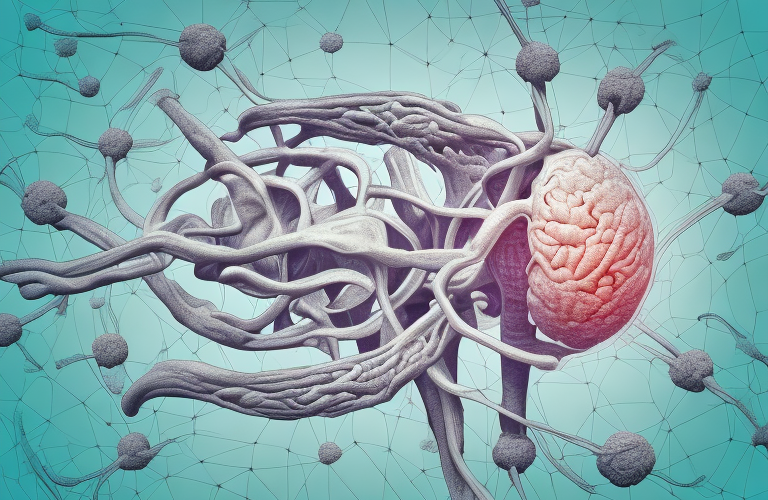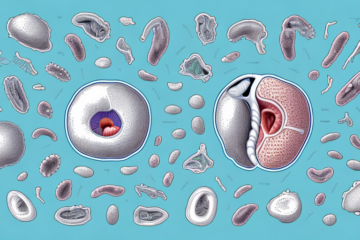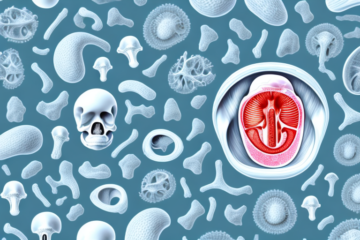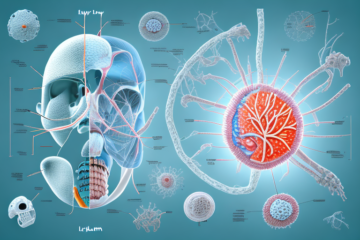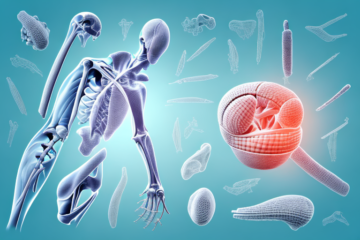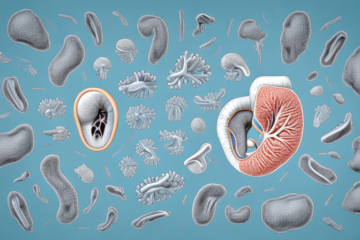The spleen is a vital organ located in the upper-left quadrant of the abdomen, next to the stomach. Its functions are numerous and include filtering blood, removing old red blood cells, and helping to fight off infections. In this article, we will take a look at the anatomy and functions of the spleen, discuss its relationship with other organs of the body, explore common medical conditions that affect the spleen, and offer tips for maintaining optimal spleen health.
What is the Spleen and Where is it Located in the Body?
The spleen is a small, fist-sized organ located in the upper-left quadrant of the abdomen, behind the rib cage. It is composed of two main parts: the white pulp and the red pulp. The white pulp is responsible for fighting off infections, while the red pulp is responsible for filtering out old or damaged red blood cells.
In addition to its immune and blood-filtering functions, the spleen also plays a role in storing and releasing red blood cells and platelets when needed. It can also act as a reservoir for white blood cells, which can be released into the bloodstream in response to an infection or injury.
While the spleen is an important organ, it is not essential for survival. In some cases, it may need to be removed due to injury or disease. However, individuals who have had their spleen removed may be at a higher risk for certain infections and should take precautions to protect their health.
Understanding the Role of the Spleen in the Immune System
The spleen plays a crucial role in the immune system. It contains a high concentration of immune cells, such as T and B lymphocytes, which are responsible for identifying and attacking invading pathogens. Additionally, the spleen produces antibodies that help to defend the body against infection.
Furthermore, the spleen also acts as a filter for the blood, removing old or damaged red blood cells and recycling their components. This process helps to maintain a healthy balance of blood cells in the body. In some cases, the spleen may need to be removed due to injury or disease, but this can increase the risk of certain infections and may require additional medical management.
How Does the Spleen Filter Blood and Remove Old Red Blood Cells?
The spleen filters blood by removing old or damaged red blood cells from circulation. The red blood cells pass through the spleen’s red pulp, where they are engulfed by specialized cells called macrophages. The macrophages break down the red blood cells and recycle the iron they contain.
In addition to filtering blood, the spleen also plays a role in the immune system. It contains white blood cells that help fight off infections and foreign invaders in the body. The spleen can also store extra red blood cells and release them into circulation when needed, such as during times of physical exertion or blood loss.
However, certain medical conditions can affect the function of the spleen. For example, if the spleen becomes enlarged due to a disease like mononucleosis or leukemia, it may need to be removed through a surgical procedure called a splenectomy. In these cases, the liver and bone marrow take over the spleen’s functions in filtering blood and producing new blood cells.
The Relationship Between the Spleen and the Liver
The spleen and the liver are closely connected, and they work together to maintain optimal health. The liver produces bile, which is stored in the gallbladder and helps to digest fats. The spleen then recycles the components of old red blood cells, such as iron, back to the liver.
In addition to their roles in digestion and blood recycling, the spleen and liver also play important roles in the immune system. The spleen acts as a filter for the blood, removing old or damaged cells and helping to fight infections. The liver produces proteins that are important for immune function and helps to remove toxins from the body. Together, the spleen and liver work to keep the body healthy and functioning properly.
What Happens When the Spleen Malfunctions or is Removed?
If the spleen is malfunctioning or is removed, the body may become more susceptible to infections. This is because the spleen plays a critical role in the immune system and helps the body to fight off invading pathogens. Additionally, the absence of the spleen can lead to anemia, a condition where there are not enough red blood cells in circulation.
Furthermore, the spleen also helps to filter and remove old or damaged red blood cells from the body. Without the spleen, these cells can accumulate and cause a condition called hemolytic anemia. In some cases, individuals who have had their spleen removed may need to take extra precautions to avoid certain infections, such as receiving vaccinations or taking antibiotics prophylactically.
Common Medical Conditions that Affect the Spleen
There are various medical conditions that can affect the spleen. Some of the most common include infections, such as mononucleosis or bacterial infections, and certain blood disorders, such as sickle cell anemia or thalassemia. Additionally, certain types of cancers can affect the spleen, such as lymphoma or leukemia.
Other medical conditions that can affect the spleen include autoimmune disorders, such as lupus or rheumatoid arthritis, and liver diseases, such as cirrhosis or hepatitis. In some cases, trauma or injury to the spleen can also cause medical complications. It is important to seek medical attention if you experience symptoms such as abdominal pain, fatigue, or anemia, as these may be signs of a spleen-related medical condition.
Diagnostic Tests Used to Evaluate Spleen Health and Function
Diagnostic tests used to evaluate spleen health and function include a physical exam, blood tests, imaging studies such as ultrasound or MRI, and biopsy. These tests can help to identify any abnormalities or diseases affecting the spleen.
One common blood test used to evaluate spleen health is a complete blood count (CBC). This test measures the number of red and white blood cells in the body, as well as platelets. Abnormalities in these levels can indicate a problem with the spleen.
In addition to these tests, doctors may also use a splenic function test to evaluate how well the spleen is working. This test involves injecting a small amount of radioactive material into the bloodstream and then using a special camera to track its movement through the body. This can help to identify any blockages or other issues affecting the spleen’s function.
Treatments Available for Splenic Disorders and Diseases
The treatment for spleen disorders and diseases depends on the underlying cause. In some cases, medications such as antibiotics may be prescribed to treat infections. For more severe conditions, such as cancer, surgery may be needed to remove the spleen. Additionally, vaccinations may be recommended to prevent certain infections in those without a functioning spleen.
In addition to medical treatments, lifestyle changes can also help manage spleen disorders and diseases. For example, individuals with an enlarged spleen may need to avoid contact sports or other activities that could cause trauma to the abdomen. It is also important to maintain a healthy diet and exercise regularly to support overall health and immune function.
Alternative therapies, such as acupuncture and herbal remedies, may also be used in conjunction with traditional medical treatments to manage symptoms and improve overall well-being. However, it is important to consult with a healthcare professional before trying any alternative therapies to ensure they are safe and effective for your specific condition.
Lifestyle Changes to Support Optimal Spleen Health
Healthy lifestyle choices can help to support optimal spleen health. This includes getting enough sleep, maintaining a healthy weight, engaging in regular exercise, and managing stress levels.
In addition to these lifestyle changes, it is important to consume a balanced and nutritious diet. Foods that are rich in antioxidants, such as fruits and vegetables, can help to protect the spleen from damage caused by free radicals. It is also important to limit the consumption of processed and high-fat foods, as they can contribute to inflammation and damage to the spleen.
Another important factor in maintaining spleen health is avoiding exposure to toxins and pollutants. This includes avoiding smoking and secondhand smoke, as well as limiting exposure to chemicals and pollutants in the environment. Taking steps to reduce exposure to these harmful substances can help to protect the spleen and promote overall health and well-being.
The Connection Between Stress and Spleen Function
Stress can have a significant impact on spleen function. High levels of stress can weaken the immune system and make the body more susceptible to infections. Additionally, stress can increase inflammation in the body, which can affect the spleen’s ability to filter blood and fight off infections.
Furthermore, chronic stress can lead to the development of autoimmune diseases, which can directly affect the spleen. Autoimmune diseases occur when the immune system mistakenly attacks healthy cells in the body, including those in the spleen. This can lead to a decrease in spleen function and an increased risk of infections.
On the other hand, managing stress through techniques such as meditation, exercise, and therapy can have a positive impact on spleen function. Studies have shown that reducing stress levels can improve immune function and decrease inflammation in the body, leading to better spleen health and overall well-being.
Foods to Eat (and Avoid) for a Healthy Spleen
A healthy diet can help to support optimal spleen health. It is recommended to eat a diet rich in fruits, vegetables, whole grains, lean protein, and healthy fats. Additionally, it is important to limit intake of alcohol, processed foods, and saturated and trans fats, which can contribute to inflammation and increase the risk of infections.
In addition to a healthy diet, regular exercise can also support spleen health. Exercise helps to improve circulation and boost the immune system, which can help to prevent infections and reduce inflammation in the spleen. It is recommended to engage in at least 30 minutes of moderate exercise, such as brisk walking or cycling, most days of the week.
Another important factor in maintaining a healthy spleen is staying hydrated. Drinking plenty of water and other fluids can help to flush toxins out of the body and prevent dehydration, which can lead to a range of health problems. It is recommended to drink at least 8-10 glasses of water per day, and more if you are engaging in strenuous exercise or spending time in hot weather.
Supplements and Natural Remedies that Support Spleen Health
Several supplements and natural remedies may help to support spleen health, including probiotics to promote good gut health, omega-3 fatty acids to reduce inflammation, and herbs such as astragalus and echinacea to boost the immune system.
In addition to these supplements and natural remedies, maintaining a healthy lifestyle can also support spleen health. Regular exercise can improve circulation and reduce inflammation, while a balanced diet rich in fruits and vegetables can provide essential vitamins and minerals.
It is important to note that while these supplements and natural remedies may support spleen health, they should not be used as a substitute for medical treatment. If you are experiencing symptoms of spleen dysfunction, it is important to consult with a healthcare professional for proper diagnosis and treatment.
Factors that Increase or Decrease Risk of Splenic Injury or Rupture
Factors that increase the risk of splenic injury or rupture include engaging in contact sports or activities that increase the risk of trauma, such as motorcycle riding or skiing. Additionally, certain medical conditions that affect the spleen, such as mono or sickle cell anemia, can increase the risk of splenic injury. Protective gear and safe practices can help to reduce the risk of injury.
On the other hand, there are also factors that can decrease the risk of splenic injury or rupture. These include maintaining a healthy lifestyle, avoiding risky behaviors, and seeking prompt medical attention for any symptoms or injuries related to the spleen. Regular check-ups and screenings can also help to detect any underlying medical conditions that may increase the risk of splenic injury.
Tips for Preventing Splenic Injuries in Contact Sports or Other Activities
If you participate in contact sports or other activities that increase the risk of splenic injury, it is important to take steps to reduce your risk. This includes wearing appropriate protective gear and following safe practices. Additionally, it is important to be aware of the signs and symptoms of a splenic injury, such as abdominal pain, nausea, and vomiting.
In conclusion, the spleen is a complex organ with many important functions. It plays a crucial role in the immune system, filters blood, and works closely with other organs, such as the liver, to maintain optimal health. By making healthy lifestyle choices, being aware of the signs and symptoms of spleen disorders, and taking steps to reduce the risk of injury, it is possible to support optimal spleen health and function.
Some additional tips for preventing splenic injuries include maintaining good physical fitness and conditioning, as well as avoiding activities that put excessive strain on the spleen, such as heavy lifting or contact sports during periods of illness or fatigue. It is also important to seek medical attention promptly if you experience any symptoms of a splenic injury, as early diagnosis and treatment can help prevent serious complications.

